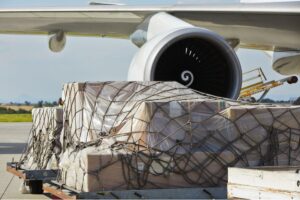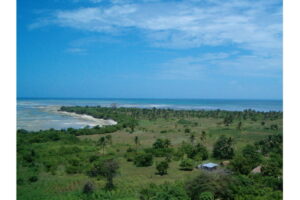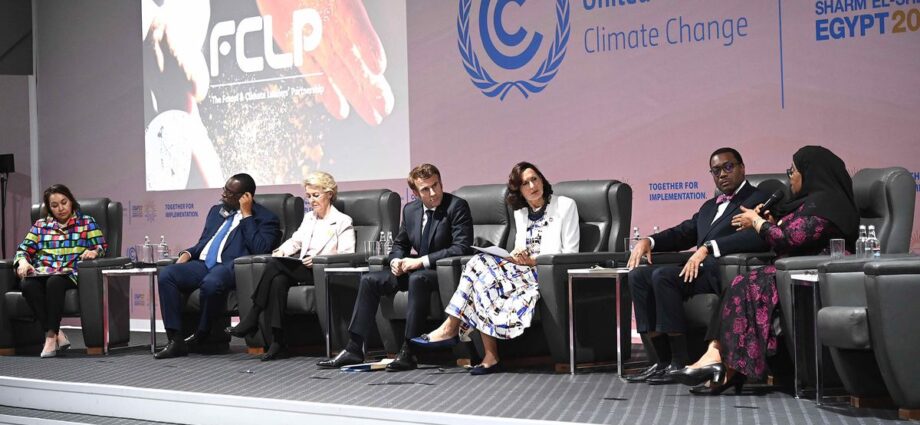This is the fifth time the COP summit has been held in Africa, with Morocco, South Africa and Kenya as former hosts. The organisers say they expect over 40,000 participants, which would make it the biggest attendance ever for a climate summit in Africa.
COP27 will be an opportunity for African political and other leaders to again put on the table their demands for action in the face of the myriad climate crises their countries are facing. Africa accounts for 15 per cent of the world’s population but is responsible for only 3.8 per cent of global carbon emissions. In fact, 48 sub-Saharan African countries outside of South Africa are responsible for just 0.55 per cent of cumulative CO2 emissions.
However, while it bears the least responsibility for the world’s climate crisis, it is hammered hardest by its most severe consequences. Seven of the ten countries most vulnerable to climate change are in Africa. The worst-hit of African countries have called on developed countries to fulfil their long overdue pledge of financing worth $100 billion a year to the developing world to combat the climate crisis.
Though that sounds big, it is still a drop in the ocean. The President of the Africa Development Bank (AfDB), Akinwunmi Adesina, holds that African governments need up to $1.6 trillion during this decade to implement the continent’s commitments to the Paris Agreement on climate change.
Sharm el-Sheikh, however, is a perfect backdrop for a severe African regional crisis, made worse by climate change. It is located at the southern tip of the desert of the Sinai Peninsula and the shoulder of the Red Sea.
On July 23, 2005, Sharm El Sheikh was rocked by a series of deadly bombings carried out by the Islamist group Abdullah Azzam Brigades. Eighty-eight people were killed, and over 200 were injured, in the deadliest terrorist attack in the history of Egypt, until it was surpassed by the 2017 Sinai mosque attack. The horrific 2017 attack killed 311 people and injured at least 128.
Egypt’s tough man, President Abdel Fattah el-Sisi, a former general, rose and consolidated power on a platform to beat back extremist violence, which he has done with deadly effect.
However, privately for Egypt, COP27 in Sharm el-Sheikh is also an advertisement for el-Sisi’s security state project and a victory lap for having raised the tourist hotspot from its deathbed, to which the tourist attacks had consigned it.
Down from Sharm el-Sheikh, along the western coast of the Red Sea, through the Gulf of Aden, and into the west side of the Indian Ocean, a record 36 million-plus people across the Horn of Africa are going hungry as Ethiopia, Kenya, and Somalia experience the worst drought in 40 years. Standing on the beach in Sharm el-Sheikh, a keen nose might pick up the smell of wasted human bodies wafting in over the sea.
The Red Sea itself is under pressure. Environmental pollution of the sea has led to the loss of up to 70 per cent of its fishing wealth.
Though the Nile River cuts through it, and to the north, it is hemmed by a 950-kilometre-long Mediterranean coast, Egypt spends hundreds of millions of dollars every year importing fish.
Ninety-five per cent of Egyptians live along the Nile or in its delta. The river provides nearly all of Egypt’s water.
River Nile, meanwhile, is being polluted and abused by the East African nations that are home to the source of the Nile River, from where a significant portion of water flows to South Sudan, Sudan and Egypt.
The health of the River Nile is, undeniably, an existential issue for Egypt, as is the Red Sea. Over 10 per cent of global trade passes through the Red Sea each year, crossing some of the most strategic waterways in the world; the Bad al-Mandab at the Red Sea’s southern entrance and Egypt’s Suez Canal in the north. The Bab-el-Mandeb is a strait between Yemen on the Arabian Peninsula and Djibouti and Eritrea in the Horn of Africa, making it a critical geopolitical zone.
The dynamics of this geographical location explain why the Horn of Africa is important for so many international powers and has become a nerve centre of 13 foreign military bases, hosting bases of the USA, China, France, Japan, Saudi Arabia, and other states. Modestly-sized Djibouti hosts six of them.
In the Horn, North Africa, and the Middle East, climate change, among others, has turned scarce water into a deadly political contest. In upper East Africa and the Horn, the bodies of those who have starved to death are piling up.
Hopefully, as the powerful, rich, and influential men and women of the world meet a short distance from these crises up the road in Sharm el-Sheikh, it will be a little harder to turn their backs on the tragic dress rehearsal of what awaits the world, if humanity fails to turn the heat down on Earth.
Share this news
This Year’s Most Read News Stories

Zanzibar airport monopoly puts 600 jobs at risk
On September 14, 2022, the director general of ZAA issued a directive that gave Dnata Zanzibar Aviation Services Limited an exclusive access to the newly constructed Terminal III, barring other operators.Continue Reading

Zanzibar liquor importers face fresh hurdle despite court order
The liquor shortage in Zanzibar is far from over, even after a court order granted relief to the three importers.Continue Reading

Muslims in Pemba conduct special prayer against ZAA decision
ZANZIBAR: More than 200 Muslims in Vitongoji Village, South Pemba Region over the weekend conducted a special prayer to condemn the Zanzibar Airports Authority (ZAA) move to appoint DNATA as the sole ground handler in Terminal III of the International Airport of Zanzibar. Abeid Amani Karume.Continue Reading











